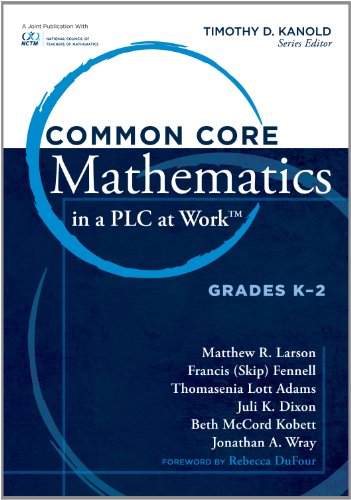How do you help your students demonstrate mathematical proficiency toward the learning expectations of the Common Core State Standards (CCSS)?
This teacher guide illustrates how to sustain successful implementation of the CCSS for mathematics for grades K 2. Discover what students should learn and how they should learn it at each grade level, including insight into prekindergarten early childhood readiness expectations for the K 2 standards, as well as the unique Counting and Cardinality standards for kindergarten.
Comprehensive and research-affirmed analysis tools and strategies will help you and your collaborative team develop and assess student demonstrations of deep conceptual understanding and procedural fluency. You'll also learn how fundamental shifts in collaboration, instruction, curriculum, assessment, and intervention can increase college and career readiness in every one of your students.
Benefits
- Discover the five essential paradigm shifts necessary to implement the CCSS for mathematics.
- Receive guidance on forming and sustaining collaborative teams in a Professional Learning Community at Work culture.
- Develop a 'less is more' content mind-set: fewer standards will result in the opportunity of time needed for deeper rigor and conceptual understanding work with students.
- Gain helpful formative assessment strategies for development of student proficiency in the Standards for Mathematical Practice.
- Access dozens of tools, activities, examples, resources, and reproducibles to help teachers and teams analyze, interpret, and implement the common core standard expectations for instruction and assessment.
- Examine the research-affirmed foundation of mathematics content and process standards from 1989 to 2010 and deepen your understanding of the common core expectations.
Matthew R. Larson, PhD, is a school district administrator, author, and nationally known speaker. He is the K-12 curriculum specialist for mathematics for Lincoln Public Schools, in Lincoln, Nebraska, where part of his work focuses on implementing effective professional learning communities to improve mathematics instruction and student achievement.
Dr. Larson has taught mathematics at elementary through college levels and has held an honorary appointment as a visiting associate professor of mathematics education at Teachers College, Columbia University. He is the coauthor of several elementary mathematics textbooks, professional books, and articles in mathematics education publications.
Francis (Skip) Fennell, PhD, is the L. Stanley Bowlsbey professor of education and graduate and professional studies at McDaniel College in Maryland, where he directs the Elementary Mathematics Specialists and Teacher Leaders Project (ems&tl). A mathematics educator who has experience as a classroom teacher, principal, and supervisor of instruction, he is a past president of the Association of Mathematics Teacher Educators and the National Council of Teachers of Mathematics.
Widely published in professional journals and textbooks related to elementary and middle-grade mathematics education, Dr. Fennell has also authored chapters in yearbooks and resource books. In addition, he has played key leadership roles for the Research Council on Mathematics Learning, Mathematical Sciences Education Board, National Science Foundation, Maryland Mathematics Commission, U.S. National Commission on Mathematics Instruction.
Thomasenia Lott Adams, PhD, is a professor of mathematics education and the interim associate dean of research in the College of Education at the University of Florida, Gainesville. Dr. Adams s research focuses on mathematics professional development and multicultural issues regarding teaching and learning mathematics.
Juli K. Dixon, PhD, is a professor of mathematics education at the University of Central Florida (UCF) in Orlando. She coordinates the award-winning Lockheed Martin/UCF Academy for Mathematics and Science. Dr. Dixon has also taught secondary mathematics at the University of Nevada, Las Vegas, and mathematics in urban school settings at the elementary, middle, secondary, and postsecondary levels.
Beth McCord Kobett is a mathematics educator and consultant. She is a former classroom teacher and mathematics specialist for Howard County, Maryland, public schools. Kobett is an assistant professor of education at Stevenson University where she teaches courses in mathematics education for preservice teachers. She is also serving as the lead consultant for the Elementary Mathematics Specialists and Teacher Leaders Project. She serves as an adjunct faculty member at McDaniel College where she teaches graduate-level courses in mathematics education.
Jonathan A. Wray is a mathematics instructional facilitator in the Howard County, Maryland, public school system. He is president-elect of the Association of Maryland Mathematics Teacher Educators and past president of the Maryland Council of Teachers of Mathematics. Wray also serves as the manager of the Elementary Mathematics Specialists and Teacher Leaders Project and chair of the Core Learning Community s Core Challenge. He has experience as a primary and intermediate elementary classroom teacher, gifted/talented resource teacher, mathematics supervisor, grant project manager, and educational consultant. Wray is professionally engaged in NCTM, serving on the board of directors.
![]()
